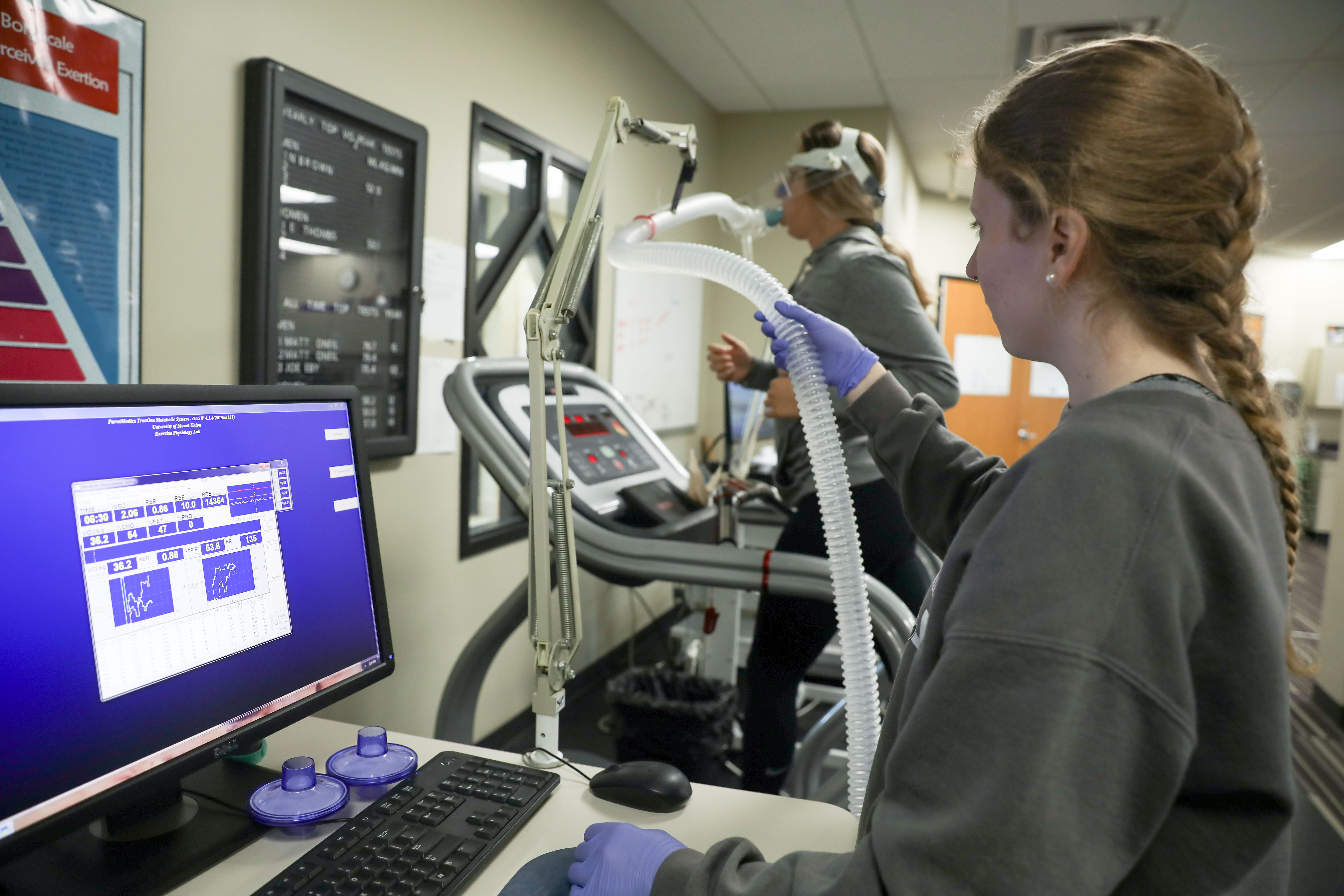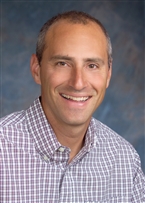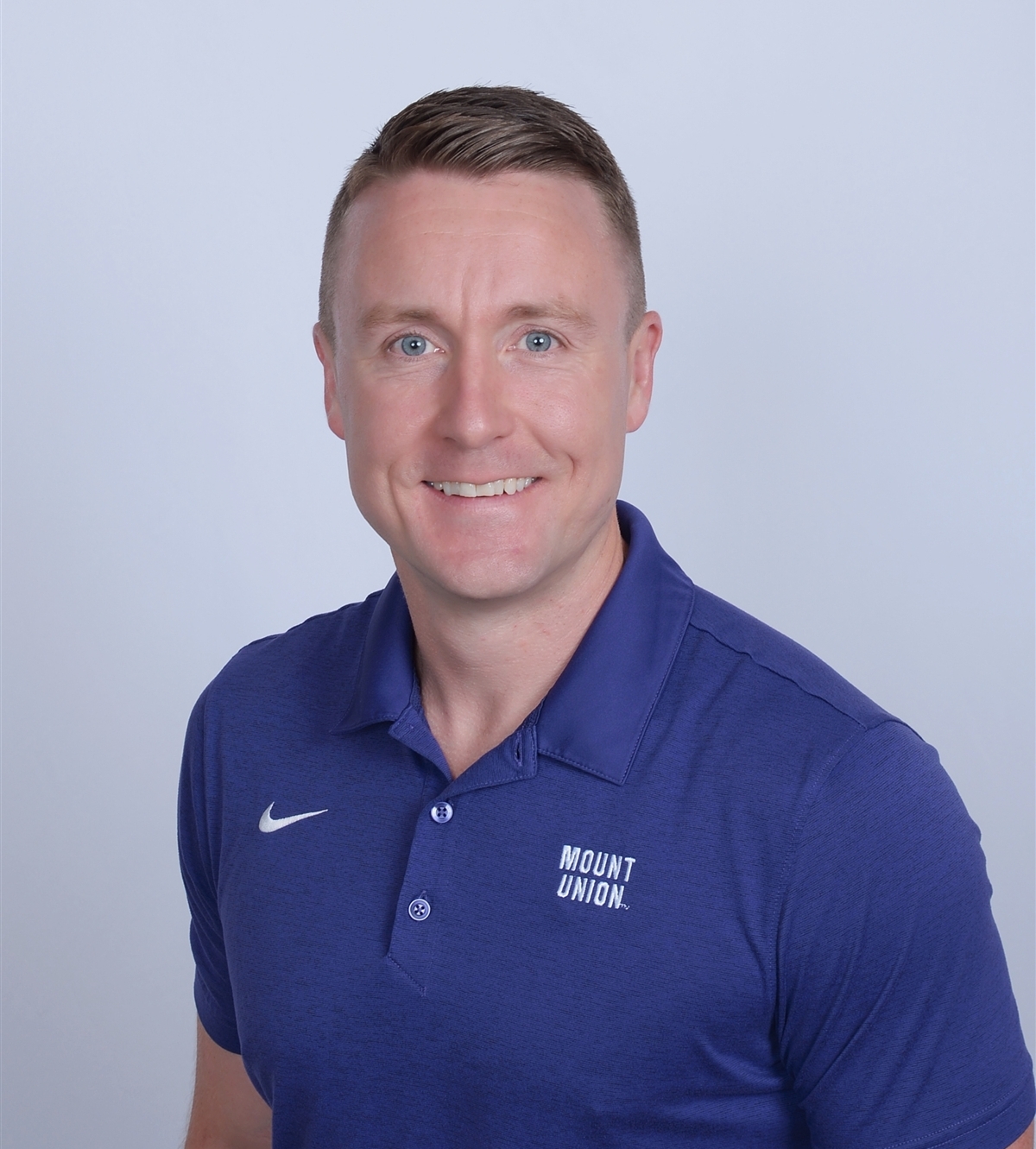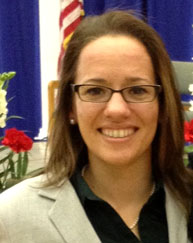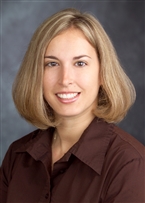Bachelor of Science in Exercise Science Degree
Exert your energy in Mount Union’s research-oriented, collaborative, community-focused Bachelor of Science in exercise science degree. We’re unique among institutions of our size for the depth, breadth, and opportunities to engage in kinesiology and exercise science, making us one of the best exercise science programs in Ohio from your very first days on campus to the professional world beyond graduation.
Embedded in Real-World Experience
The 57-credit BS in exercise science pairs classroom knowledge with real-world applications. Our state-of-the-art research facilities, small class sizes, invested professors, and wide-ranging opportunities for experiential learning—both on- and off-campus—equip you for the dynamic demands of an allied-health career.
With a meaningful understanding of exercise physiology, human movement, anatomy, and scientific inquiry, you’ll be ready to explore various jobs in exercise science or excel in a graduate program to launch a rewarding career in areas like kinesiology, nutrition, physical therapy, and physician assistant studies.
Early Assurance Pathway
Accelerate your career in physician assistant studies, physical therapy, or medical school by applying for our early assurance pathways as a current or future undergraduate.
Learn More About the Major
Move toward opportunities to research, serve, and grow through the Bachelor of Science in exercise science degree at Mount Union. Use the buttons below to request information or, if you're ready to start your exercise science journey, apply today!
VIEW VIRTUAL TOUR
Launch 2025 Exercise Science
Want a sneak peek of campus? Explore Mount Union from the comfort of your home!
-
Curriculum
CurriculumMount Union’s exercise science major, one of the best undergraduate exercise science programs, equips you to understand fitness, performance, and health across the lifespan. You’ll build foundations in anatomy, physiology, kinesiology, biology, and chemistry, then refine your expertise in areas like pharmacology, cardiac rehabilitation, corporate and worksite wellness, and applied practice designing fitness programs for specific populations.
The BS in exercise science is an experiential degree that involves practicum courses, hands-on research, and opportunities to apply your learning in many extracurricular contexts. Learn more about the curriculum in the academic course catalog.
Seminar Series
Dive into important topics in the Exercise Science Seminar Series, a pair of courses you’ll take in your sophomore and senior years. These two-credit seminars nurture your development and confidence as a professional.
The Sophomore Seminar emphasizes professional skills, including written and oral communication, networking, mock interviews, and joining regional or national-level professional associations
The Senior Seminar capstone course provides an open forum through which you and your peers will examine current events and discuss how they relate to the major.
-
Learning Objectives
As you work toward graduating with an exercise science degree, you will:- Demonstrate a sound foundational knowledge and understanding of human physiology including relevant principles of nutrition, biology, and chemistry, along with an advanced understanding of human anatomy, as they relate to responses and adaptations to exercise and physical activity.
- Demonstrate basic laboratory skills pertaining to assessments, laboratory methods, sound experimental and analytical practices, data acquisition, and reporting in the exercise sciences.
- Demonstrate knowledge of the importance and influence of exercise, physical activity, and nutrition on an individual’s health and well-being. In addition, you should steadfastly be an advocate for physically active lifestyles as a means to improve quality of life and reduce the risk and prevalence of lifestyle-related diseases.
- Demonstrate requisite skills and abilities for meaningful employment in exercise science-related areas or to pursue graduate studies in an exercise science-related area.
-
Experiential Learning
Hands-On LearningLearning by doing is integral to our educational approach at Mount Union. Throughout the major, you’ll seek out and stumble into meaningful opportunities to deepen your understanding of course concepts, apply your classroom knowledge in real-world contexts, and develop a network of peers and professionals.
Independent Research (Senior Research Projects)
Interrogate phenomena at the forefront of the exercise science field through Mount Union’s robust undergraduate research program. Our research facilities include an electrocardiogram (ECG), heart rate monitors and sphygmomanometers, laboratory treadmills and cycle ergometers, and metabolic carts.
In your senior year, you’ll design and conduct a research project to develop vital skills in planning, executing, and sharing research findings. Some recent projects include:
- Can a Typical Swimmer’s Snorkel Elicit the Same Physiological Effects as an Acute Sojourn to Moderate Altitude?: This project assessed the ability of a snorkel worn during training to elicit the same physiological adaptations as altitude training.
- The Effects of Palm Cooling During Aerobic Training: This project observed whether handheld cooling packs could assist the body in maintaining core temperature while exercising in the heat.
- Does Beta-Alanine Supplementation Affect Muscular Performance After Caffeine Ingestion?: This study examined the effects of caffeine ingestion compared to beta-alanine supplementation in power output, repetitions to failure, rate of perceived exertion, focus, alertness and fatigue.
Research With Faculty or Student Peers
Collaborative research can achieve exciting results. Some of our recent faculty-student research projects have been presented at:
- International Society of Sports Nutrition (2022) in Clearwater, FL
- Midwest American College of Sports Medicine (2022) in Indianapolis, IN
- Biomechanics (2022)
- American College of Sports Medicine (2019) in Orlando, FL
Laboratory Experience
Learning hands-on using real-world instruments equips you to excel in internships, research projects, and your career. In our program, you’ll routinely run a variety of exercise tests including maximal aerobic capacity tests (VO2 max), body composition testing via air displacement plethysmography (Bod Pod), Electromyography (EMG), power output and rate of force development (Ballistic Measurement System), and anaerobic power tests (Wingate) using a cycle ergometer.
Internships
Earn course credit, gain relevant work experience, and unlock job opportunities by completing an internship in exercise science. Much like your career prospects, ideal locations for internships include university strength and conditioning programs, private sport performance facilities, physical therapy clinics, local YMCAs, and more.
Some of our recent internship employers:
- Premier Sports Conditioning
- T3 Sports Performance
- University of Akron
- Kent State University
- Louisiana State University
- Kansas State University
- Iowa State University
- Northern Arizona University
Campus Programs
Apply your learning right here on campus through programs that help your peers thrive: work as a fitness trainer or group exercise instructor in the Recreation Center or complete fitness assessments and evaluations for Mount Union athletic teams.
Community-Based Fitness Programs And Assessment
Contribute to YMCA-based exercise and physical activity programs where you’ll help design fitness assessments, coursework, and personal training plans for local community members and high school athletic teams.
Community Service
Share your knowledge, skills, and abilities with our community! Mount Union runs a variety of programs to promote healthy and active lifestyles for our neighbors of any age, health status, or living environment. This tremendous real-world experience benefits your professional growth while you give back to those around you.
-
Student Organizations
Get involved with club and organization options that fit just about any passion, hobby, or career path. Mount Union’s exercise science-related student organizations are a venue for you to develop lasting relationships, expand your career skills, and put your learning into practice.Exercise Science Club
Learn from guest speakers, prepare your professional school applications, attend career-focused workshops, and join community outreach projects through the Exercise Science Club. If you’re an exercise science major, minor, or share an interest in the field—especially if you plan to go into allied-health professions—you’ll benefit from the club’s collaboration and camaraderie.
Inter-Science Research Club
Gain practical research experience in the sciences and prepare for a health-related career with the support of resources like:
- An annual trans-disciplinary campus conference open to the public
- Presentations during an annual trip to Experimental Biology
- Cross-departmental funding for research supplies and research travel
- Professor-student research presentations to increase awareness and collaboration
-
Careers
CareersThe exercise science major prepares you for a variety of rewarding career paths in and related to allied-health medical professions. With our degree, you can transition directly into a related job or pursue further professional credentials in a graduate program.
According to the Bureau of Labor Statistics, many roles in this field demonstrate growing demand, such as physical therapist assistants and aides, which are estimated to expand 24% by 2031, or fitness trainers and instructors, which will see 19% growth over the same period.
Entry-level roles within exercise science, such as exercise physiologists, earn upwards of $47,900 per year, while positions that require further study, like physical therapists, earn average salaries over $95,000 annually.
Common Careers- Exercise technologist
- Exercise specialist
- Program director
- Exercise leader
- Health/fitness instructor
- Health/fitness director
- Advanced personal trainer
- Certified strength and conditioning specialist
Recent Employers- Akron General Health and Wellness
- Fit Works
- Ohio Institute of Pain Management
- Best Personal Fitness
- Cameron Wellness Center
- Holmes Spine and Sport Chiropractic
-
Graduate Schools
Career Possibilities with a Bachelor’s in Exercise Science
Clinical:
- Cardiac rehabilitation
- Advanced personal trainer: Advanced personal trainers work with both healthy individuals and those with health challenges seeking to pursue independent exercise, improve physical fitness levels and performance, manage health risks and promote lifelong behavioral changes.
General health and wellness:
- Personal trainer
- Health/fitness director
- Corporate wellness
Performance enhancement:
- Certified strength and conditioning specialist: Certified strength and conditioning coaches use exercise prescription to help clients improve athletic performance, prevent injury and apply the proper mechanics of their sport.
Research and development:
- Technician: responsible for conducting fitness testing, collecting and analyzing data, and preparing reports.
- Product design: Develop products that meet a need in the fitness or wellness industry (e.g., apparel, exercise equipment, cell phone applications, etc.).
- Project manager
Sales:
- Medical equipment
- Exercise equipment
- Pharmaceuticals
Nutrition:
- General population
- Sport performance
Career Possibilities with an Advanced Degree
Athletic training
Clinical:
- Cardiac rehabilitation
- Chiropractor
- Medical Doctor
- Nurse
- Nutrition/Dietetics
- Occupational Therapist
- Physical Therapist
- Physician Assistant
- Movement Analysis
Higher Education:
- Teacher
- Researcher
Recent Graduate Schools
- Chatham University
- Wheeling Jesuit University
- The Ohio State University
- University of Dayton
- University of Pittsburgh
- Ball State University
- Colorado State University
- New York Chiropractic College
